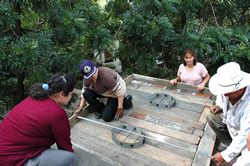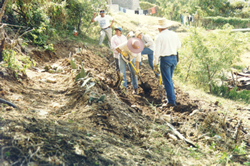![]()
|
|
|
Week-long courses are hosted at the “Tree of Life” Training Center in Tlancualpican, Mexico. Workshops are offered on realistic low-cost and low-tech methods for improving daily life. These methods focus on using readily available resources, remaining economically attainable for rural residents, integrating ancient and modern technologies and preserving the environment. The objective is for those trained to serve their communities as resource persons, sharing their new skills and knowledge with their families and neighbors. Pueblo Partners provides concerned people and churches with an opportunity to become involved in a development ministry that:
We invite you, your organization, church, district and/or conference to sponsor a scholarship for one or more persons for a one-week training course. Each one-week unit costs $300 per person. Scholarships are needed to continue this vital ministry that enables people to live a life of dignity and self-reliance. Please advise the GYTTE program, by e-mail or fax, if you would like to take advantage of this opportunity to bless your brothers and sisters in Mexico.  PUEBLO PARTNER’S
INTRODUCTORY COURSE COMMUNITY DEVELOPMENT
The objective is to better family
life, decrease human drudgery, promote an atmosphere of mutual support
and increase understanding about the preservation of the environment
through the sharing of technologically appropriate alternatives.
*WORKSHOPS:  Dry Composting Toilet System Fuel-Efficient Mud Stoves Solar Cookers Water Pumping System:
Low-Cost Construction:
 Crafts using Recycled Materials:
PUEBLO
PARTNER’S
INTERMEDIATE COURSE AGRICULTURAL DEVELOPMENT The objective is to preserve and enhance the condition of the land in order to boost agricultural production that can improve family nutrition and increase family income by teaching sustainable agricultural methods - both ancient and modern. *WORKSHOPS:  Soil Conservation & Erosion Control:
Irrigation
Methods
Multi-Purpose
Trees PUEBLO PARTNER’S
ADVANCED COURSE LIVESTOCK DEVELOPMENT
The objective is to genetically improve the livestock of the region, increase livestock production, provide animal protein and increase family income through the introduction of food and income-producing animals and the teaching of environmentally-sound livestock management practices. *WORKSHOPS: Livestock Management  Feed and Nutrition Corrals, Pens and Shelters Animal Reproduction Animal Health *Livestock Sold at Subsidized Prices to Villagers:
|